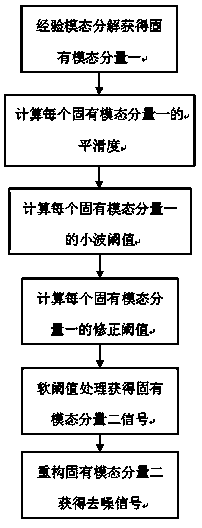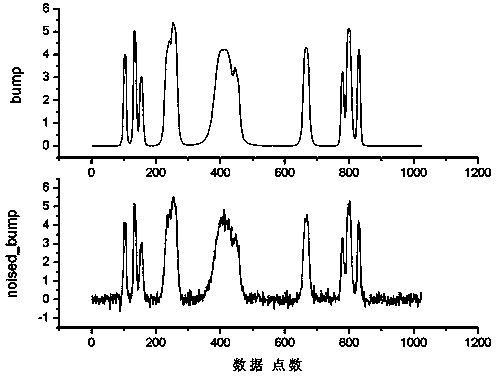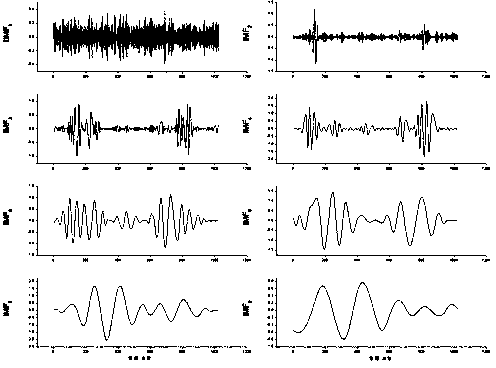Empirical mode decomposition denoising method based on revised wavelet threshold value
An empirical mode decomposition and wavelet threshold technology, applied in the field of signal denoising, can solve the problems of low signal-to-noise ratio, unstable denoising effect, easy loss of useful signals, etc., and achieve high signal-to-noise ratio and strong self-adaptation Effect
Inactive Publication Date: 2014-06-18
JIANGSU UNIV
View PDF3 Cites 16 Cited by
- Summary
- Abstract
- Description
- Claims
- Application Information
AI Technical Summary
Problems solved by technology
However, due to the essential difference between wavelet analysis and EMD, this method of directly applying the wavelet method to the EMD threshold denoising method has unstable denoising effect, easy to lose useful signals and the signal-to-noise ratio of the denoised signal is low
Method used
the structure of the environmentally friendly knitted fabric provided by the present invention; figure 2 Flow chart of the yarn wrapping machine for environmentally friendly knitted fabrics and storage devices; image 3 Is the parameter map of the yarn covering machine
View moreImage
Smart Image Click on the blue labels to locate them in the text.
Smart ImageViewing Examples
Examples
Experimental program
Comparison scheme
Effect test
Embodiment Construction
the structure of the environmentally friendly knitted fabric provided by the present invention; figure 2 Flow chart of the yarn wrapping machine for environmentally friendly knitted fabrics and storage devices; image 3 Is the parameter map of the yarn covering machine
Login to View More PUM
 Login to View More
Login to View More Abstract
The invention provides an empirical mode decomposition denoising method based on a arevised wavelet threshold value. The method is characterized by comprising the following steps of first carrying out the empirical mode decomposition on an original signal to acquire a plurality of intrinsic mode functions I with the frequency being gradually reduced and a remainder term; calculating the smoothness of each intrinsic mode function I; calculating a threshold value of each intrinsic function I by utilizing a wavelet threshold value method; revising the threshold value obtained through the wavelet method according to the smoothness and a serial number of each intrinsic mode function I; carrying out the soft threshold value treatment on each intrinsic mode function I by utilizing the revised threshold value to obtain an intrinsic mode function II; finally reconstructing the intrinsic mode function II to obtain a denoised signal. The method is good in self-adaptability, the threshold value calculated by adopting the wavelet threshold value method is revised through the smoothness index, a signal with high signal-to-noise ratio is obtained on the premise of guaranteeing the smoothness, and the method can be used for denoising the ultrasonic signal.
Description
technical field [0001] The invention belongs to the field of signal denoising, in particular to an empirical mode decomposition denoising method based on modified wavelet threshold. Background technique Signals inevitably introduce noise during generation and measurement. These noises are superimposed on the original signal, which interferes with the subsequent analysis and processing of the original signal. The research of many scholars revolves around the signal and has received positive results. Commonly used denoising methods include filter denoising, Fourier transform denoising and wavelet decomposition denoising. The Empirical Mode Decomposition (EMD) method is a signal analysis method proposed by Dr. E Huang of NASA. It decomposes the signal according to the time scale characteristics of the data itself, without presetting any basis function. Since the IMF components decomposed by the EMD method are arranged according to the frequency, according to this charact...
Claims
the structure of the environmentally friendly knitted fabric provided by the present invention; figure 2 Flow chart of the yarn wrapping machine for environmentally friendly knitted fabrics and storage devices; image 3 Is the parameter map of the yarn covering machine
Login to View More Application Information
Patent Timeline
 Login to View More
Login to View More Patent Type & Authority Applications(China)
IPC IPC(8): G06F19/00G06T5/20
Inventor 李伯全贺鹏飞张西良
Owner JIANGSU UNIV
Features
- R&D
- Intellectual Property
- Life Sciences
- Materials
- Tech Scout
Why Patsnap Eureka
- Unparalleled Data Quality
- Higher Quality Content
- 60% Fewer Hallucinations
Social media
Patsnap Eureka Blog
Learn More Browse by: Latest US Patents, China's latest patents, Technical Efficacy Thesaurus, Application Domain, Technology Topic, Popular Technical Reports.
© 2025 PatSnap. All rights reserved.Legal|Privacy policy|Modern Slavery Act Transparency Statement|Sitemap|About US| Contact US: help@patsnap.com



